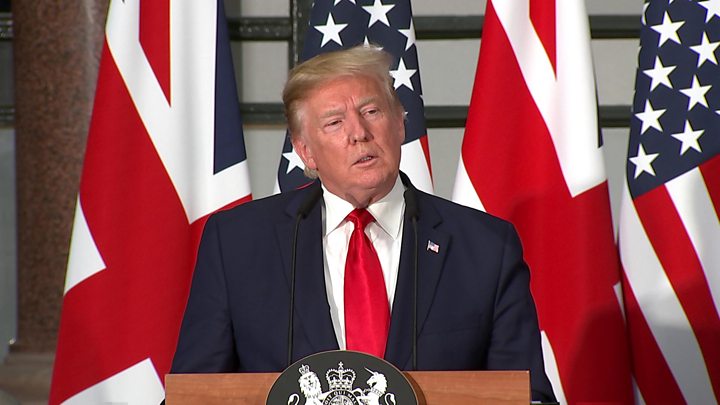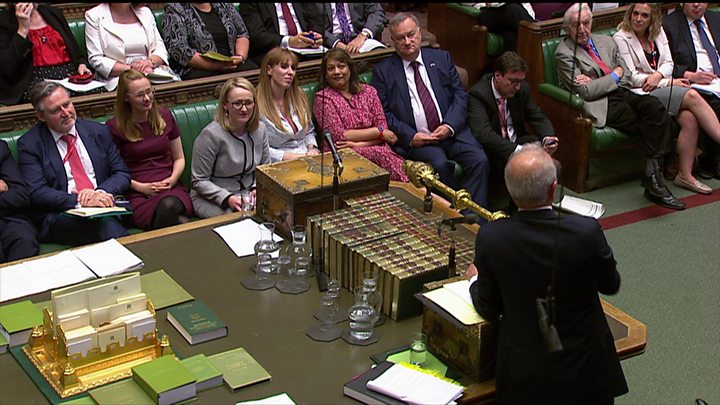Trump state visit: President rows back on NHS trade remarks
 Image copyright Getty Images
Image copyright Getty Images Donald Trump has rowed back on his remarks that the NHS should form part of a future trade deal between the UK and US.
The comment, made during his state visit to the UK, prompted a backlash from Conservative leadership candidates, Labour and trade unions.
But on Wednesday, the US president told ITV’s Good Morning Britain: “I don’t see it being on the table.”
He added that the NHS was something he would “not consider part of trade”.
Current rules allow foreign firms to bid for NHS contracts and a subsidiary of the US company United Health is among private groups which have already successfully done so.
Some, though, fear the health service is vulnerable to creeping privatisation or a weakening of the tight control the NHS currently keeps on drug prices if US firms get greater access.
At a press conference in London on Tuesday, Mr Trump was asked whether he believed the NHS should be part of a trade deal between the UK and US after Brexit.
He told reporters: “When you’re dealing with trade everything is on the table, so the NHS or anything else, or a lot more than that.
“But everything will be on the table, absolutely.”

Media playback is unsupported on your device
The comments led to fierce criticism from a number of MPs, including from Health Secretary and leadership hopeful Matt Hancock.
He had already condemned similar comments from the US Ambassador to the UK Woody Johnson, and tweeted: “Dear Mr President. The NHS isn’t on the table in trade talks – and never will be. Not on my watch.”
Former Brexit Secretary Dominic Raab said: “The NHS is not for sale to any country and never would be if I was prime minister.”
And International Development Secretary Rory Stewart said he would not be “offering up” the NHS in any trade deal.
Labour leader Jeremy Corbyn, who spoke at a protest rally against President Trump moments before the president’s press conference, also tweeted: “Our NHS is not up for sale”.
In his GMB interview, the president appeared to backtrack
But standing in for Theresa May at Prime Minister’s Questions, Cabinet Office Minister David Lidington said the NHS “is not and will not be up for sale”.

Media playback is unsupported on your device
David Henig, former trade negotiator for the UK government – and now UK director of the European Centre For International Political Economy – said Mr Trump was “right the first time” and “everything is potentially up for grabs in a trade agreement”.
He told BBC Radio 4’s Today programme it would be up to the government to decide which NHS services could be provided by private suppliers and which would be served by the public sector.
But, if an element was opened up to private tenders, “the US and other countries would want access”.
Mr Henig said the biggest issue between the countries over healthcare was the price of drugs, as the NHS pays significantly less to pharmaceutical companies than the US.
He said: “We should be specific on what we are prepared to give and what we want to seek in trade agreements. So far, we have been pretty vague.
“We should be publishing, as soon as possible, a consultation document saying, ‘this is what we are prepared to talk about in regards to the NHS, this is what we are not prepared to talk about in terms of trade’, so everybody is entirely clear.”
About 7% of the English health budget goes to private providers. There are different contracting arrangements in other parts of the UK.
BBC Health editor Hugh Pym says the head of NHS England, Simon Stevens, has called for new legislation to drop the requirement for health commissioners to put contracts out to tender.
But, he adds, if the government decides to do this it’s not clear whether that might be overridden by the demands of a trade deal in the future.

